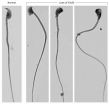(Press-News.org) Ambitious mitigation efforts, however, could decrease the pollution by 50 percent. The analysis is the very first to quantify this.
"Nitrogen is an irreplaceable nutrient and a true life-saver as it helps agriculture to feed a growing world population – but it is unfortunately also a dangerous pollutant," says Benjamin Bodirsky, lead-author of the study. In the different forms it can take through chemical reactions, it massively contributes to respirable dust, leads to the formation of aggressive ground-level ozone, and destabilizes water ecosystems. Damages in Europe alone have been estimated at around 1-4 percent of economic output, worth billions of Euro. About half of these nitrogen pollution damages are from agriculture. This is why the scientists ran extensive computer simulations to explore the effects of different mitigation measures.
Both farmers and consumers would have to participate in mitigation
"It became clear that without mitigation the global situation may markedly deteriorate as the global food demand grows," says Bodirsky, who is also affiliated to the International Center for Tropical Agriculture, Colombia (CIAT). "A package of mitigation actions can reverse this trend, yet the risk remains that nitrogen pollution still exceeds safe environmental thresholds."
Only combined mitigation efforts both in food production and consumption could substantially reduce the risks, the study shows. Currently, every second ton of nitrogen put on the fields is not taken up by the crops but blown away by the wind, washed out by rain or decomposed by microorganisms. To reduce losses and prevent pollution, farmers can more carefully target fertilizer application to plants' needs, using soil measurements. Moreover, they should aim at efficiently recycling animal dung to fertilize the plants. "Mitigation costs are currently many times lower than damage costs," says co-author Alexander Popp.
"For consumers in developed countries, halving food waste, meat consumption and related feed use would not only benefit their health and their wallet," Popp adds. "Both changes would also increase the overall resource efficiency of food production and reduce pollution."
"Health effects of nitrogen pollution more important than climate effects"
"The nitrogen cycle is interwoven with the climate system in various ways," Hermann Lotze-Campen points out, co-author of the study and co-chair of PIK's research domain Climate Impacts and Vulnerabilities. Nitrous oxide, or laughing gas, on the one hand is one of the major greenhouse gases. On the other hand, nitrogen containing aerosols scatter light and thereby cool the climate. And as fertilizing nutrient, nitrogen enhances the growth of forests which binds CO2. "Currently the health effects of nitrogen pollution are clearly more important, because the different climate effects largely cancel out," says Lotze-Campen. "But this may change – hence limiting nitrogen would have the double benefit of helping our health today and avoiding climate risks in the future."
INFORMATION:
Article: Bodirsky, B.L., Popp, A., Lotze-Campen, H., Dietrich, J.P., Rolinski, S., Weindl, I., Schmitz, C., Müller, C., Bonsch, M., Humpenöder, F., Biewald, A., Stevanovic, M. (2014): Reactive nitrogen requirements to feed the world in 2050 and potentials to mitigate nitrogen pollution. Nature Communications [DOI:10.1038/ncomms4858]
Weblink to Nature Communications where the article will be published: http://www.nature.com/naturecommunications
For further information please contact:
PIK press office
Phone: +49 331 288 25 07
E-Mail: press@pik-potsdam.de
Twitter: @PIK_Climate
Dangerous nitrogen pollution could be halved
2014-05-13
ELSE PRESS RELEASES FROM THIS DATE:
Male infertility: It's all about the package
2014-05-13
Cold Spring Harbor, NY – Infertility is generally thought of as a woman's problem. In fact, more than 3 million men across America also experience it. Today, researchers from Cold Spring Harbor Laboratory (CSHL) describe a key event during sperm development that is essential for male fertility. A team led by CSHL Professor Alea Mills explains how a protein controls DNA packaging to protect a man's genetic information.
The sperm is a simple delivery vehicle for a man's genetic information. The highly specialized cell is little more than a DNA bundle powered by molecular ...
Concerns raised over EU ban on ditching unwanted fish
2014-05-13
New rules banning fishermen from throwing away unwanted fish they have caught could harm wildlife – and fail to improve fish stocks, a University of Strathclyde report has found.
The study, published in the journal Nature Communications, suggests new reforms to the European Union's Common Fisheries Policy (CFP) – ending the practice of throwing away unwanted fish caught at sea – may have unintended consequences. The new CFP took effect on 1 January 2014 and will phase out the discarding of fish between 2015 and 2019.
The aim is to improve fish stocks – but Professor ...
Researchers identify genetic marker linked to OCD
2014-05-13
A group of researchers led by Johns Hopkins scientists say they have identified a genetic marker that may be associated with the development of obsessive-compulsive disorder (OCD), whose causes and mechanisms are among the least understood among mental illnesses.
The results of the research are published online May 13 by the journal Molecular Psychiatry.
"If this finding is confirmed, it could be useful," says study leader Gerald Nestadt, M.D., M.P.H., a professor of psychiatry and behavioral sciences at the Johns Hopkins University School of Medicine and director of ...
Humans and companion animals harbor the same types of MRSA infections
2014-05-13
A shared population of methicillin-resistant Staphylococcus aureus (MRSA) bacteria circulates both in humans and companion animals, according to a study published this week in mBio®, the online open-access journal of the American Society for Microbiology.
"Our study demonstrates that humans and companion animals readily exchange and share MRSA bacteria from the same population," says senior author Mark Holmes, senior lecturer in preventive veterinary medicine at the University of Cambridge in England. MRSA naturally lives on the skin and also causes difficult-to-treat ...
E-cigarettes and mental health
2014-05-13
Researchers at University of California, San Diego School of Medicine report that people living with depression, anxiety or other mental health conditions are twice as likely to have tried e-cigarettes and three times as likely to be current users of the controversial battery-powered nicotine-delivery devices, as people without mental health disorders.
They are also more susceptible to trying e-cigarettes in the future in the belief that doing so will help them quit, the scientists said. The FDA has not approved e-cigarettes as a smoking cessation aid.
The study will ...
Novel target found for chemotherapy-resistant leukemia cells
2014-05-13
Researchers at Children's Hospital Los Angeles have discovered that by targeting a particular receptor, chemotherapy-resistant cancer cells can be killed in an acute form of childhood leukemia, offering the potential for a future treatment for patients who would otherwise experience relapse of their disease.
Nora Heisterkamp, PhD, and colleagues at The Saban Research Institute of Children's Hospital Los Angeles have discovered that by targeting the B-cell activating receptor (BAFF-R), chemotherapy-resistant precursor B acute lymphoblastic leukemia cells (pre-B ALL) can ...
Older, sicker men with early-stage prostate cancer do not benefit from aggressive treatment
2014-05-13
Treating older men with early-stage prostate cancer who also have other serious underlying health problems with aggressive therapies such as surgery or radiation therapy does not help them live longer and, in fact, can be detrimental, according to a study by UCLA researchers.
The study followed the cases of more than 140,500 men aged 66 and older diagnosed with early-stage prostate cancer between 1991 and 2007 from the Surveillance, Epidemiology and End Results (SEER) Medicare database. Men who also suffered from multiple major medical conditions such as a history of ...
Study: Former prisoners, parolees turn to emergency departments for care
2014-05-12
AURORA, Colo. (May 12, 2014) – Being released from prison or jail is a difficult time for the millions of Americans returning to their communities from correctional facilities. Add to the list of challenges a high risk of winding up in the emergency department or the hospital. That's according to a new study from the University of Colorado School of Medicine.
The study, published in the Journal of General Internal Medicine, provides support for efforts to improve access to insurance and readily available health care for this vulnerable group.
"This study comes at a ...
Researchers find new molecule to treat asthma
2014-05-12
La Jolla, Calif., May 12, 2014 -- A new study carried out by researchers at Sanford-Burnham Medical Research Institute (Sanford-Burnham), the Max Planck Institute for Colloids and Interfaces (Germany), the Free University of Berlin (Germany), UC San Diego, and Shinshu University (Japan) has identified a novel molecule that prevents T-cells from orchestrating asthma brought on by allergens. The findings, published on May 12 in Proceedings of the National Academy of Sciences (PNAS), show promise for a new potent therapeutic agent to treat asthma, a chronic disease affecting ...
JAX researchers identify potential therapeutic target for wound-healing and cancer
2014-05-12
A Jackson Laboratory research team led by Professor Lenny Shultz, Ph.D., reports that a protein involved in wound healing and tumor growth could be a potential therapeutic target.
In one of nature's mixed blessings, the mechanisms that work to heal cuts and wounds, rebuilding damaged cells, can also go out of control and cause cancer. But understanding those mechanisms could lead to new ways of stimulating healing in wound patients and dialing back cancerous proliferation.
An inactive rhomboid protease, iRhom2, is normally a short-lived protein that controls a cascade ...


